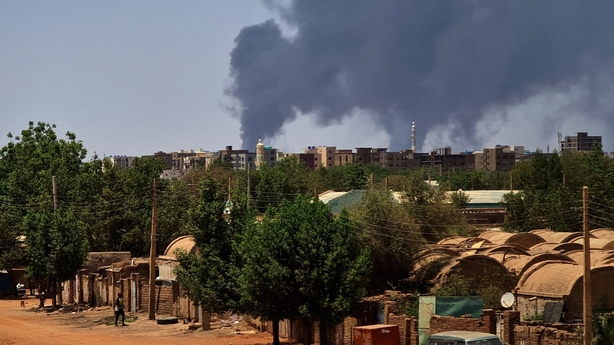"We really are running out of everything. Most of the hospitals are closed. Most of the medicines are running out. It's affecting everything."
As Sara Bahir Mohammed spoke to RTÉ News from Khartoum, the desperation that she and her family and friends feel is palpable.
The United Nations estimates that in excess of 73,000 people have so far fled the fighting in Sudan, with that figure expected to rise considerably.
The UN says it has arrived at a planning figure of more than 800,000 people who could eventually leave Sudan if the situation there continues, or deteriorates further.
For all of those who have left there are many more, like Sara and her mother and sister, who remain in a city where gunfire and airstrikes are now a way of life.

Talk of ceasefires, Sara told RTÉ News, is not borne out on the ground.
"A ceasefire does not apply to me or to where I am," Sara says, "we hear talk of a ceasefire but then there is heavy gunfire, shooting" with no lull in fighting.
Recordings from Sara’s phone bear this out - consistent heavy gunfire can be heard from close by, highlighting the daily terror so many in Khartoum are now living with.
That fear of what could happen to those who venture out is one of the reasons Sara says she and her family have chosen to stay put for the moment.
Sara’s sister and brother-in-law are based in Ireland where they are both employed in the health sector. Her father, who was visiting Ireland when the war broke out, remains here.
But Sara and her mother and remaining family members say an attempt to leave the city would now be too dangerous and too uncertain.
'Really tough journey'
Getting to Egypt is a trip which could now take from four days to a week, and with many dangers en route.
"I can't just put my mother and my family through this kind of pressure because it's a lack of food and water. You just remain in the fields and there's no beds ... you just stay in your cars so it's a really tough journey," Sara says.
At one point they had hoped to move to their uncle’s house which is about 40 minutes away from them, but fighting erupted and people texted to say it was not secure to leave their home, so they stayed where they were monitoring the situation "hoping that next week would be better".
When, or if, this situation will improve is impossible to tell.
Basic infrastructure like hospitals and banks are no longer functioning. The lack of access to money also hampers attempts to get out.
Unable to access funds vital to get them to safety and help in establishing a new life, many remain in the hope that the situation might stabilise.
But with no sign of that yet, fears grow about the conflict destabilising other countries in the region grows also.
Many of the nieghbouring countries like Chad, Ethiopia and Libya which have seen an influx of refugees from Sudan are already dealing with their own crises - from drought to conflict to rising food prices.
Sara Bashir Mohamed says the international community needs to provide assistance as the humanitarian situation worsens, but it also needs to push both parties in the conflict to end the fighting.
Rather than viewing this as an internal conflict, she says, the international community should see this as an issue which affects the world and provide any help needed to resolve it.
GOAL, the aid agency for which Sara works, faces similar problems to other humanitarian organisations as they struggle to provide vital aid in a very insecure situation.
"Resources are extremely limited" Jessica Cope of GOAL in Sudan says, adding that they are "seeing an enormous influx of refugees arrive in South Sudan".
In a region which has seen a large amount of conflict and mass displacement, the "scale and severity of this crisis could have long-lasting implications for the region", Ms Cope says.
It’s a concern raised time and again by those watching events unfold in Sudan.
In the meantime it is people like Sara and her family caught up in a situation they did not ask for and can see little prospect of getting out of any time soon.




